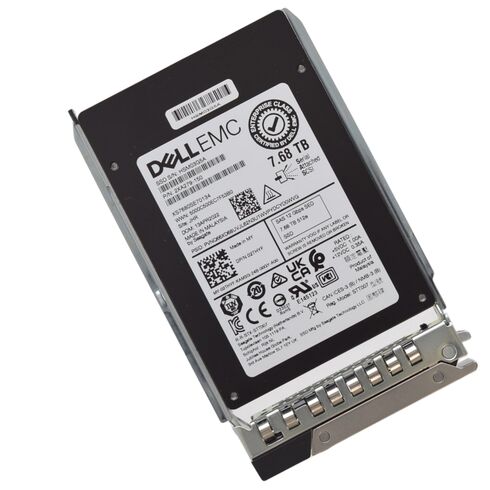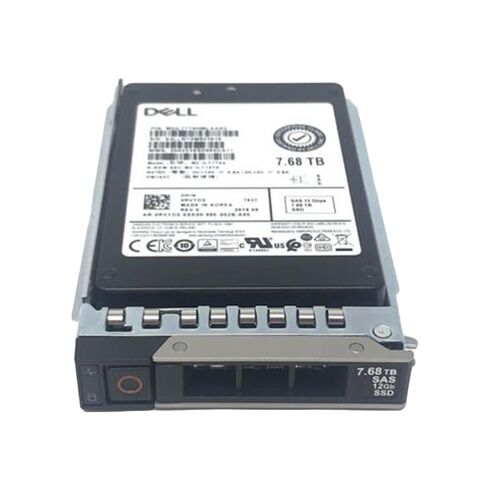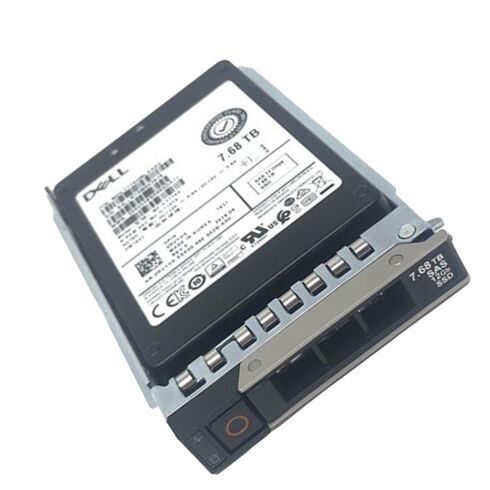345-BHFV Dell 7.68TB SAS-12GBPS TLC SSD
- — Free Ground Shipping
- — Min. 6-month Replacement Warranty
- — Genuine/Authentic Products
- — Easy Return and Exchange
- — Different Payment Methods
- — Best Price
- — We Guarantee Price Matching
- — Tax-Exempt Facilities
- — 24/7 Live Chat, Phone Support
- — Visa, MasterCard, Discover, and Amex
- — JCB, Diners Club, UnionPay
- — PayPal, ACH/Bank Transfer (11% Off)
- — Apple Pay, Amazon Pay, Google Pay
- — Buy Now, Pay Later - Affirm, Afterpay
- — GOV/EDU/Institutions PO's Accepted
- — Invoices
- — Deliver Anywhere
- — Express Delivery in the USA and Worldwide
- — Ship to -APO -FPO
- — For USA - Free Ground Shipping
- — Worldwide - from $30
Overview of the DELL 7.68TB Self-Encrypting SSD
Discover the high-performance DELL 7.68TB Self-Encrypting Solid State Drive, engineered for efficiency and reliability in data-intensive applications.
Key Details
- Manufacturer: DELL
- Part Number: 345-BHFV
Technical Specifications
Drive Type and Capacity
- Drive Type: Internal Solid State Drive
- Total Capacity: 7.68TB
- NAND Flash Technology: V-NAND TLC
- Form Factor: 2.5 Inches (15 mm SSF)
- Interface: SAS 12Gb/s
- Endurance Rating: Read-intensive
- Encryption Type: Self-Encrypting Drive (SED)
- DWPD: 1 Write Per Day
Performance Metrics
- Sequential Read Speed: 4150 MB/s
- Sequential Write Speed: 3700 MB/s
- Random Read IOPS: 595,000 IOPS
- Random Write IOPS: 155,000 IOPS
Compatibility Information
Supported Systems
- PowerEdge C6600
- PowerEdge C6615
- PowerEdge C6620
- PowerEdge MX760c
- PowerEdge R440
- PowerEdge R450
- PowerEdge R550
- PowerEdge R650
- PowerEdge R650xs
- PowerEdge R6515
- PowerEdge R660
- PowerEdge R6615
- PowerEdge R6625
- PowerEdge R740
- PowerEdge R740xd
- PowerEdge R750
- PowerEdge R750xa
- PowerEdge R750xs
- PowerEdge R7515
- PowerEdge R760
- PowerEdge R7615
- PowerEdge R7625
- PowerEdge R940
- PowerEdge T550
- PowerEdge XR7620
- PowerVault MD2424
Interface: SAS-12GBPS
What is SAS-12GBPS?
SAS-12GBPS stands for Serial Attached SCSI with a data transfer rate of 12 gigabits per second. It is the latest iteration of the SCSI (Small Computer System Interface) protocol and offers significant performance advantages over its predecessors. SAS-12GBPS is commonly used in enterprise environments where high-speed data transfer and reliability are crucial.
Benefits of SAS-12GBPS
1. Enhanced Performance
The primary advantage of SAS-12GBPS is its superior performance compared to previous versions. With a data transfer rate of 12 gigabits per second, it delivers lightning-fast read and write speeds, enabling faster access to data and improved overall system performance. This is particularly beneficial for applications that require high-speed data processing, such as databases, virtualization, and data analytics.
2. Scalability
SAS-12GBPS provides excellent scalability, allowing users to expand their storage capacity as their needs grow. It supports multiple devices connected in a daisy-chain configuration, enabling easy addition or removal of drives without disrupting the entire system. This flexibility makes it ideal for businesses that require a scalable storage solution to accommodate their expanding data requirements.
3. Reliability and Data Integrity
SAS-12GBPS offers advanced features that ensure data integrity and reliability. It incorporates error detection and correction mechanisms that detect and fix data errors during transmission, minimizing the risk of data corruption. Additionally, SAS-12GBPS supports dual-port connectivity, allowing for redundant paths to the drives, ensuring continuous access to data even in case of a single point of failure.
The Importance of SAS-12GBPS
1. High-Performance Storage
In today's data-driven world, businesses rely heavily on fast and efficient storage solutions to meet their demanding workloads. SAS-12GBPS offers the speed and performance required to handle intensive applications and workloads, ensuring smooth operations and reducing latency. It enables organizations to process large amounts of data quickly, resulting in improved productivity and customer satisfaction.
2. Seamless Integration
SAS-12GBPS is widely adopted in enterprise storage systems, making it compatible with a vast array of servers, storage arrays, and other SAS-enabled devices. This compatibility ensures seamless integration with existing infrastructure, minimizing the need for additional investments or disruptions during implementation. It simplifies the process of upgrading storage systems by providing a straightforward path for migration from older storage technologies to SAS-12GBPS.
3. Future-Proofing
Investing in SAS-12GBPS technology ensures future-proofing your storage infrastructure. As data volumes continue to grow exponentially, it is essential to have a storage solution that can keep up with the increasing demands. SAS-12GBPS provides the necessary speed, scalability, and reliability to meet the evolving needs of businesses, allowing them to stay ahead of the competition and adapt to changing market requirements.
In conclusion,
SAS-12GBPS offers significant benefits in terms of performance, scalability, reliability, and compatibility. Its high-speed data transfer rate, seamless integration with existing infrastructure, and future-proofing capabilities make it an ideal choice for enterprise storage solutions. Whether you need to handle intensive workloads or require a scalable storage solution, SAS-12GBPS provides the necessary features to meet your requirements and ensure smooth operations for your business.
Encryption: Encrypting Sed
What is Encrypting Sed?
Encrypting Sed (Self-Encrypting Drive) is a security feature that provides hardware-based encryption for data stored on the Dell 7.68TB SSD. It uses advanced encryption algorithms to protect sensitive information, ensuring that it remains secure even if the drive is lost or stolen.
Benefits of Encrypting Sed
1. Data Security
The primary benefit of Encrypting Sed is its ability to secure data stored on the drive. With hardware-based encryption, the data is encrypted in real-time as it is written to the drive, ensuring that it remains protected at all times. This feature is particularly important for businesses that handle sensitive information, such as financial institutions, healthcare organizations, and government agencies.
2. Compliance with Regulations
Many industries have specific regulations and compliance requirements regarding data security and privacy. Encrypting Sed helps businesses meet these requirements by providing a robust encryption solution. By encrypting data at the hardware level, organizations can demonstrate compliance with industry standards and regulations, avoiding potential legal and financial penalties.
3. Ease of Use
Encrypting Sed offers a user-friendly experience, making it easy for individuals and businesses to implement and manage encryption on their Dell 7.68TB SSD. The encryption process is transparent to users and does not require any additional software or configuration. Once enabled, the drive automatically encrypts all data written to it, eliminating the need for manual intervention and ensuring a seamless workflow.
The Importance of Encrypting Sed
1. Protection against Data Breaches
Data breaches can have severe consequences for businesses, including financial losses, reputational damage, and legal liabilities. Encrypting Sed provides an additional layer of security, mitigating the risk of unauthorized access to sensitive data even if the drive is compromised. It significantly reduces the likelihood of data breaches and helps organizations maintain trust and confidence among their customers and stakeholders.
2. Safeguarding Intellectual Property
Intellectual property is a valuable asset for businesses, and unauthorized access or theft can have devastating consequences. Encrypting Sed ensures that intellectual property stored on the Dell 7.68TB SSD remains protected, preventing unauthorized individuals from gaining access to confidential information, trade secrets, or proprietary data. This feature is particularly important for research institutions, software development companies, and other knowledge-based industries.
3. Meeting Data Privacy Requirements
With the increasing focus on data privacy, organizations are under pressure to protect personal information and ensure compliance with data protection regulations such as GDPR (General Data Protection Regulation) and CCPA (California Consumer Privacy Act). Encrypting Sed helps businesses meet these requirements by encrypting personal data stored on the drive, reducing the risk of unauthorized disclosure and ensuring individuals' privacy rights are respected.
In conclusion,
Encrypting Sed provides robust data security, compliance with regulations, and ease of use for users of the Dell 7.68TB SSD. By encrypting data at the hardware level, it ensures that sensitive information remains protected, mitigates the risk of data breaches, safeguards intellectual property, and helps organizations meet data privacy requirements. Implementing Encrypting Sed is a proactive step towards enhancing data security and maintaining trust in today's digital landscape.
Endurance: Read Intensive
What is Read Intensive?
Read Intensive is a term used to describe a type of solid-state drive (SSD) designed to handle a higher volume of read operations compared to write operations. It is optimized for applications and workloads that primarily involve reading data, such as web servers, content delivery networks (CDNs), and read-heavy databases.
Benefits of Read Intensive SSDs
1. Improved Read Performance
Read Intensive SSDs are designed to deliver exceptional read performance, allowing for faster data retrieval and improved overall system responsiveness. By prioritizing read operations, these drives can handle high read workloads more efficiently, resulting in reduced latency and faster access to frequently accessed data. This is particularly beneficial for applications that rely heavily on read operations, such as serving web content or running read-heavy databases.
2. Enhanced Endurance
Read Intensive SSDs are engineered to withstand a higher number of read operations over their lifespan compared to write-intensive or mixed-use SSDs. By minimizing the number of write operations, these drives experience less wear and tear on the flash memory cells, resulting in improved endurance and longevity. This makes them an ideal choice for applications where high read workloads are expected.
3. Cost-Effective Solution
Read Intensive SSDs offer a cost-effective storage solution for applications that mainly involve reading data. As these drives prioritize read operations over write operations, they typically have lower write endurance specifications compared to write-intensive SSDs. This translates into a lower cost per gigabyte, making them an attractive option for businesses looking to balance performance and cost-efficiency.
The Importance of Read Intensive SSDs
1. Optimal Performance for Read-Heavy Applications
Many applications, such as web servers, CDNs, and caching systems, are predominantly read-focused. Utilizing Read Intensive SSDs ensures optimal performance for these applications by delivering fast read speeds and low latency. By leveraging the strengths of these drives, businesses can provide a seamless user experience, reduce response times, and handle high read workloads efficiently.
2. Extended Drive Lifespan
Read Intensive SSDs are designed to handle a higher volume of read operations, resulting in improved endurance and longer drive lifespan. By choosing a Read Intensive SSD for applications that primarily involve reading data, businesses can maximize the drive's lifespan and minimize the need for frequent replacements or upgrades. This reduces maintenance costs and provides a more cost-effective storage solution in the long run.
3. Cost-Efficiency without Sacrificing Performance
For businesses looking to optimize their storage infrastructure while keeping costs under control, Read Intensive SSDs offer an excellent balance between performance and cost-efficiency. These drives provide the necessary read performance for demanding applications at a lower cost per gigabyte compared to write-intensive or mixed-use SSDs. By choosing Read Intensive SSDs, organizations can achieve the desired performance levels without overspending on unnecessary write endurance.
In conclusion,
Read Intensive SSDs are a reliable and cost-effective storage solution that delivers exceptional read performance, enhanced endurance, and optimal performance for read-heavy applications. By utilizing these drives in applications where reading data is more prevalent than writing, businesses can achieve faster data retrieval, extended drive lifespan, and cost-efficient storage infrastructure. Whether you are running web servers, CDNs, or databases with predominantly read workloads, Read Intensive SSDs offer the performance and reliability you need.
Technology: TLC
What is TLC?
TLC stands for Triple-Level Cell, which is a type of NAND flash memory technology commonly used in solid-state drives (SSDs). TLC offers higher storage capacity and lower cost compared to other NAND flash memory technologies, making it an attractive choice for consumer and entry-level enterprise SSDs.
Benefits of TLC Technology
1. Higher Storage Capacity
TLC technology allows for storing three bits of data per memory cell, resulting in higher storage density compared to Single-Level Cell (SLC) or Multi-Level Cell (MLC) technologies. This increased storage capacity enables manufacturers to produce SSDs with larger capacities at a more affordable price point, making them accessible to a wider range of users.
2. Cost-Effective Solution
TLC SSDs are generally more cost-effective compared to SLC or MLC SSDs due to their higher storage density and lower manufacturing costs. This makes TLC technology an excellent choice for budget-conscious consumers and businesses that require high-capacity storage without breaking the bank. It offers a good balance between performance, capacity, and affordability.
3. Energy Efficiency
TLC SSDs offer improved energy efficiency compared to other NAND flash memory technologies. By storing more data per cell, TLC drives can access larger chunks of data at once, reducing the number of read and write operations required. This results in lower power consumption and extended battery life for devices such as laptops, tablets, and smartphones that utilize TLC-based SSDs.
The Importance of TLC Technology
1. Affordable High-Capacity Storage
TLC technology addresses the growing need for high-capacity storage solutions at an affordable price point. As data volumes continue to increase, consumers and businesses require larger storage capacities without incurring exorbitant costs. TLC SSDs provide a cost-effective solution by offering higher storage densities and competitive pricing, allowing users to store and access their data without compromise.
2. Performance and Reliability
While TLC SSDs may not offer the same endurance or write performance as SLC or MLC SSDs, they still provide excellent performance for everyday computing tasks. TLC technology has evolved over the years, with advancements in controller firmware and error correction mechanisms improving both performance and reliability. For most consumer and entry-level enterprise applications, TLC SSDs offer more than sufficient performance and reliability.
3. Energy Efficiency for Mobile Devices
The energy efficiency of TLC SSDs makes them particularly suitable for mobile devices such as laptops, tablets, and smartphones. These devices often operate on battery power, and optimizing energy consumption is crucial for extending battery life. By utilizing TLC-based SSDs, manufacturers can offer devices with larger storage capacities while still maintaining excellent battery life.
In conclusion,
TLC technology provides a cost-effective solution for high-capacity storage requirements without sacrificing performance or reliability. With its higher storage density, competitive pricing, and energy efficiency, TLC-based SSDs are an excellent choice for consumers and businesses looking for affordable storage solutions. Whether you need a large-capacity SSD for your personal computer or a cost-effective storage solution for your entry-level enterprise needs, TLC technology offers the right balance between capacity, performance, and affordability.
Hot-plug: 1
What is Hot-plug?
Hot-plug is a feature that allows users to connect or disconnect a device from a system without requiring a system restart or interrupting the operation of other connected devices. In the context of the Dell 7.68TB SSD, the Hot-plug feature enables users to add or remove the drive from a compatible system while it is powered on and in operation.
Benefits of Hot-plug
1. Flexibility and Convenience
The Hot-plug feature provides flexibility and convenience for users who need to add or remove storage devices from their systems without interrupting their workflow. It eliminates the need to power down the entire system or perform complex configurations, saving valuable time and reducing downtime. This is particularly useful in enterprise environments where system availability and continuity are critical.
2. Scalability and Upgradability
Hot-plug allows for easy scalability and upgradability of storage systems. Users can add additional drives to increase storage capacity or replace faulty drives without disrupting the overall system operation. This flexibility is especially important in environments where storage demands are constantly evolving, allowing businesses to adapt quickly to changing needs.
3. Maintenance and Troubleshooting
Hot-plug simplifies maintenance and troubleshooting procedures by enabling technicians to replace or upgrade drives without shutting down the system. This reduces the impact on productivity and minimizes the risk of data loss. It also allows for faster diagnosis and resolution of drive-related issues, as technicians can quickly swap out drives to isolate problems and perform necessary repairs.
The Importance of Hot-plug
1. Business Continuity
In today's fast-paced business environment, minimizing downtime is crucial for maintaining productivity and ensuring uninterrupted operations. Hot-plug enables businesses to add or replace storage devices on the fly, eliminating the need for system shutdowns or disruptions. This ensures business continuity, minimizes productivity losses, and maintains customer satisfaction.
2. Scalable Storage Solutions
Hot-plug plays a vital role in scalable storage solutions, allowing businesses to expand their storage capacity as their needs grow. By adding additional drives without interrupting system operation, organizations can accommodate increasing data volumes and ensure their storage infrastructure keeps pace with growing demands. This scalability is essential for businesses that require flexibility and agility in managing their data storage













